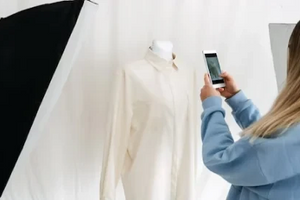In the world of children's fashion, sweatshirts and sweaters occupy a place of honor, providing not only warmth and comfort, but also excellent opportunities for creativity and individual style. From bright and playful designs to classic and cozy styles, children's sweatshirts and jumpers are becoming an essential part of the wardrobe of little fashionistas. In this article we will look at the latest trends in the world of children's clothing, share ideas on how to transform an ordinary sweatshirt and sweater using various techniques and creative approaches. Let's dive into the world of children's fashion together and explore the possibilities of creating stylish and cozy looks for our little fashion designers. We’ll also figure out the difference between a sweater and a sweatshirt.
The history of the sweatshirt is very interesting. The father of a young football player sewed a loose cotton sweater for his son, which was comfortable and not as hot as a sweater, but warmer than a shirt. This was lucky for everyone else, because this way people got a sweatshirt (from the combination of “sweater” and “shirt”).
Main differences
Let's talk about a sweatshirt and a sweater, what is the difference between them? Thanks to the Champion sportswear brand, the sweatshirt went into mass production and almost immediately acquired its own characteristics:
- round collar with cuff;
- without hood;
– does not come with a high neck, like a turtleneck, or with a turn-down collar;
- ribbed panel on the chest to remove excess moisture;
– straight, loose cut, length just below the waist;
– no fasteners;
– long raglan sleeves;
- cuffs at the waist and sleeves.
Modern models sometimes change the shape of the collar to follow the fashion of the moment, but otherwise the style remains standard. And if so, then the main transformations occur in design - each season has its own real colors.
What is "raglan"
“Raglan” is a specific style or type of sleeve cut that differs from the usual ones. A raglan sleeve extends from the underarm to the top of the neck, creating a slanted line from the shoulder to the underarm. This style gives the garment a special shape and provides a more comfortable fit.
Raglan sleeve characteristics:
– Slanted seam. The raglan sleeve creates a slanted seam from the shoulder to the underarm. This distinguishes it from traditional sleeves that run horizontally from the shoulder.
– Comfort and mobility. Raglan sleeves provide greater freedom of movement in the shoulder area, making them popular in casual wear, sportswear and activewear.
– Stylish appearance. Raglan sleeves can give a garment a modern and stylish appearance, especially when used in combination with different colors or materials.
The raglan style is often used in sportswear and casual wear, including T-shirts and other outerwear. Traditionally, a similar cut was used for a sweatshirt. Today the word “raglan” has become synonymous with a sweatshirt and a sweatshirt, so there is no difference in meaning between them.
Oversized sweatshirts
Oversized clothing, that is, clothing that looks a little too big, is one of the most expressive trends of the season, which teenagers love so much. There is no denying that such items of clothing are not only stylish, but also extremely comfortable and a real pleasure to wear. Sweaters can also be spacious.
A huge advantage is the ease of wearing them. The loose cut does not restrict movement, does not ride up or cut into the body. In addition, such outfits are made from fabrics that are very pleasant to the touch, for example, natural cotton, which is usually used to make comfortable tracksuits. Thanks to this, such clothes are airy and light, and also do not require complex care.
Oversized sweatshirts are an ideal solution for children and teenagers.
Oversized sweatshirts for teenagers are a stylish and comfortable option in the world of teenage fashion. Here are some characteristics and recommendations for choosing oversized sweatshirts for teenagers:
– Loose fit that provides more space and creates a fashionable design.
– Convenience and comfort, as sweatshirts are usually made of soft and comfortable materials, which makes them an excellent choice for active teenagers.
– Variety of styles and designs. They can have different prints, logos, appliques or be plain.
– Pairing with other clothes. Sweatshirts go well with jeans, leggings, sweatpants or even skirts, allowing teens to express their style creatively.
– Warm and cozy. The larger size provides extra insulation, making it a great choice for cooler days or evenings.
When choosing an oversized sweatshirt for a teen, it's important to consider your child's style and color preferences and ensure the right fit for comfort and confidence.
Pullover
These are knitted or crocheted outerwear that provide warmth while covering the baby's arms and torso. Typically, these clothes are soft and flexible. Initially, sweaters are made from wool, which retains heat well. Nowadays, sweaters can be made from other fibers such as cotton or polyester.
The neckline of the sweater can be V-shaped or round, and the length can be below or above the hip. There are also sweaters that are long enough to be worn as short dresses, which will especially appeal to girls 10-16 years old.
Sleeve lengths can vary from 3/4 to short and long sleeves. Sweaters can be worn by children of all ages, regardless of gender. They are versatile and can be worn over other clothes or on the naked body. Sweaters can be worn with a shirt and, if they are long enough, like a short dress, then with a belt and tights. They can also be worn fashionably by tying them at the waist or shoulders.
Sweater vs sweatshirt
So what is the difference between a sweater and a sweatshirt? Both types of clothing provide warmth. However, a sweater is knitted or crocheted, and a sweatshirt is made in the same way as sportswear. Another difference between the two is that while both can be made from wool, cotton or polyester, a sweater is softer because it is knitted from threads. The sweatshirt is not elastic, but soft. The inner lining has fluffy pile.
A sweater is more versatile than a sweatshirt. It can be worn every day or worn for the holidays. It can be worn with a shirt or as a short dress. On the other hand, a sweatshirt has a casual or sporty look and is more often worn with sweatpants as workout wear, although it can also be used as leisure wear.
In addition, there are currently many models of sweaters available in our online store (closed and open neck, V-neck, high collar, short, long sleeves, etc.). However, most sweatshirts have almost the same silhouette and do not have a zipper or hood.
The most important differences between sweatshirts for boys and girls
These are two separate worlds of fashion design that differ not only in style, but also in cut, design and details. These are the essential elements that allow children to express their style and personality. This popular wardrobe item has some unique features.
Differences in cut and shape
Sweatshirts for girls and boys differ in cut and shape. Models for boys usually have a simpler, looser cut. They have wide shoulders and long sleeves for comfort and freedom of movement.
Models for girls, on the contrary, are distinguished by a more defined waist and a tapered cut, emphasizing the silhouette. Sleeves are usually shorter and narrower to better fit the shoulders.
Differences in styles and patterns
Styles and models also vary. Boys' hoodies often feature more subdued colors and patterns, such as simple stripes, geometric shapes, or large lettering. Guys also prefer sporty accents, such as a sports team or brand logo.
However, the girls' version often comes in a wide variety of colors and patterns. It may contain delicate floral patterns, pastel shades and embellishments such as embroidery or lace.
Sweatshirts for boys and girls, despite the obvious differences in cut, style, patterns and colors, allow you to create a creative style that reflects the character of the owner. Wearing a sweatshirt is a reflection of modern fashion, where boundaries are becoming increasingly blurred. The key to a successful style is to understand the differences in cut and correctly combine a sweatshirt with other items of clothing to highlight the child’s individual style.



